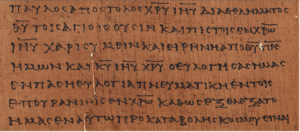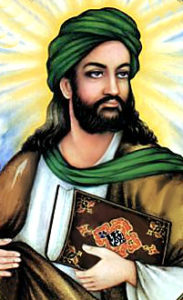by Graham Phillips | Nabeel Qureshi tragically went to be with The Lord on Saturday 16th September after battling an aggressive form of stomach cancer for over a year. At the age of just 34, Qureshi leaves behind a young family who are the subject of my prayers this week. Qureshi accomplished much in his relatively short stay in this world, the Christian apologist was a devout Muslim for two-thirds of his life. His remarkable conversion is the subject of my post; what was it that caused Qureshi to eventually renounce Islam (at great personal cost) and follow Christ?
Here are the four most prominent reasons why:
1. A faithful friend
While studying as an undergraduate Qureshi met David Wood, a mischievous character with a chequered past who had become a follower of Christ while serving time in jail. Wood, a student of apologetics had a penchant for lively debate and possessed an intellect to match Qureshi’s own. Instead of sidestepping any potentially awkward conversation about faith, Wood was happy to dive right in and challenge Qureshi. This friendship formed the context for Qureshi’s grapple with his most deeply held convictions and beliefs. Though their debates would occasionally end in acrimony their friendship acted as a kind of safety net. It was Wood who introduced Qureshi to Christian apologists Mike Licona and Gary Habermas and allowed him the opportunity to test the case for Christ and see if Islam could measure up.
Really loving your friends means telling them the truth and being willing to share Christ with them no matter how uncomfortable it might feel. Wood wasn’t friends with Qureshi because he wanted to turn him to Christ, he wanted him to turn to Christ because he was his friend. Also, having even a basic understanding of apologetics and arguments for Christianity is a useful tool for every Christian. Qureshi admits that it wasn’t the arguments that eventually led him to accept Christ but that they led him to a place where accepting Christ was even a possibility.
2. The Case for Christ
Muslims are taught that the New Testament has been corrupted and cannot be trusted to give an accurate account of the life of Jesus. This despite the Qu’ran affirming both that the gospel is the word of Allah (Surah 2:4-5) and also that the word of Allah is incorruptible (Surah 6:34). Qureshi also believed that the New Testament had been changed time and time again but mistakenly assumed that his point was proven by the fact there are multiple translations available; NIV, KJV, NKJV, ESV etc.

An example of an early Greek manuscript
Not understanding that these are not literally different versions of the New Testament narrative but merely linguistic variations on the theme of 1st century Greek documents that biblical scholars have access to today. The differences between these translations are not in the content of the narrative but rather in the style of translation from the original language. Qureshi came to appreciate the reliability of the New Testament based upon these widely accepted facts:
i) The gospels and epistles were written very soon after the reported resurrection of Jesus (between 40AD and 90AD). Place names, rulers, and events mentioned in the New Testament are constantly confirmed by historians rather than found to be fallacious.
ii) There are over 5k Greek manuscripts (and a further 19k in other languages) of the New Testament documents dating back to as early as 130AD. Around a 100 year gap from when they were originally written. This is remarkably close when you consider the gap between the writing date and earliest manuscripts for other famous texts of antiquity; Livy’s Roman History – 900 year gap, Tacitus – 1000 year gap, Herodotus & Thucydides – 1300 year gap. Even then, there are only a handful of copies of these manuscripts. The accounts of the life of Jesus come early after the events and in great multitude. This is very strong historical data.
iii) The widely reported ‘differences’ in these early manuscripts are certainly there, however they are almost entirely minor differences in spelling and grammar. There is not a single Christian doctrine that rests upon any disputed text.
Qureshi was also deeply impacted by the evidence for the resurrection of Christ. Many Muslims hold to the ‘swoon theory’, that postulates that Jesus didn’t actually die on the cross but simply appeared to. The Qu’ran claims that it wasn’t Jesus that the romans crucified but rather another man who looked a lot like him (Surah 4:157). Both swoon theory and substitute theory appear ridiculously improbable in the light of the established evidence of the resurrection:
i) That Jesus of Nazareth was crucified by Pontius Pilate
ii) That he was buried in the tomb of Joseph of Arimathea
iii) That the tomb was discovered empty on the third day by a group of His women followers
iv) That his followers believed they had encountered the risen Jesus. It is recorded that 500 men at one time saw him. Many of these suffered extreme persecution and even death because they refused to deny what they had seen.
v) Skeptics and enemies of Jesus’s including Saul of Tarsus and Jesus’s half brother James became his followers after claiming to have seen him risen from the dead.
These facts are widely accepted by scholars in relevant fields, by Christian and atheist alike. They throw a great deal of shade over swoon theory and substitute theory as viable explanations of these facts. If Jesus hadn’t actually died on the cross then Pilate and his cohort had failed to do something that they were notoriously famous for doing; killing. Secondly, for a Roman soldier to let a condemned criminal survive the cross was a crime punishable by death. Thirdly, had Jesus survived crucifixion against all the odds, imagine the state he would have been in. Would the disciples really have rescued that poor, mutilated creature from the tomb and then boldly proclaimed his resurrection from the dead? I don’t think so. Do we really need to spend time refuting the substitute theory when Jesus’s own mother was present at his crucifixion. I think not.
Qureshi became captivated by this Jesus and at the same time found himself in inner turmoil. How could this be true? What if it was true? It would mean he would have to leave all he knew of the world and its workings behind. That was a decision he realised he was not prepared to make based upon the evidence alone, he needed more.
3. The truth about Mohammed
Perhaps the most difficult part of Qureshi’s journey was uncovering  the historical Mohammed. The self-proclaimed prophet of God and war-lord was not in fact the peace loving, holy man Qureshi had believed he was. Islamic theology affords the title of al-Insan al-Kamil to Mohammed, which means “the man who has attained perfection.” The true picture of the life of Mohammed is very far from perfect. Authoritative Islamic sources including the Qu’ran, Sahih Bukhari and Sahih Islam tell us this about Mohammed:
the historical Mohammed. The self-proclaimed prophet of God and war-lord was not in fact the peace loving, holy man Qureshi had believed he was. Islamic theology affords the title of al-Insan al-Kamil to Mohammed, which means “the man who has attained perfection.” The true picture of the life of Mohammed is very far from perfect. Authoritative Islamic sources including the Qu’ran, Sahih Bukhari and Sahih Islam tell us this about Mohammed:
i) That he married a six year old and consummated the marriage when she was nine (Sahih Bukhari)
ii) That he ordered the assassination of a mother of five. She was breast feeding one of her children when she was murdered. When the assassin told Mohammed he had difficulty with what he had done, Mohammed showed no remorse. (Ibn Sa’d)
iii) He had black magic cast on him (Sahih Bukhari)
iv) He tortured people for money (Ibid)
v) He caused his adopted son to divorce so he could marry his daughter in law, Zainab (Qu’ran, Sahih Muslim)
vi) He attempted suicide (Sahih Bukhari)
These uncomfortable realities about the prophet Qureshi had revered all his life threw him into a spin. In the midst of this inner vortex of chaos and fear, Qureshi knew that only one thing could settle him now. He must hear from God. God will show him whether it is Islam or Christianity that is the one true path to Him. Duly, God spoke.
4. The witness of the Spirit
Qureshi asked God for three dreams to help him arrive at a definite  conclusion, and three dreams God delivered. Each one spoke with surgical precision into Qureshi’s life. Condemning Islam as a false
conclusion, and three dreams God delivered. Each one spoke with surgical precision into Qureshi’s life. Condemning Islam as a false
religion, revealing Christ as the narrow way and showing him the cost of choosing Christ; he must renounce Islam and all that goes with it.
The great friendship with David Wood, the persuasive arguments for Christianity and the truth about Mohammed had led Qureshi to a place of brokenness and vulnerability before God. How many of us have been led to that same place? Perhaps it’s that we don’t know we really need to hear from Him until all of our comforts have been removed. Thank God that He is faithful! Relationships, study and reasoning can be of great use, but it is only the voice of our maker that is able to truly lead us on that narrow way.
In honour of Nabeel Qureshi 1983-2017.
Sources
Seeking Allah, Finding Jesus – Nabeel Qureshi
No Fields Found.

Leave a Reply